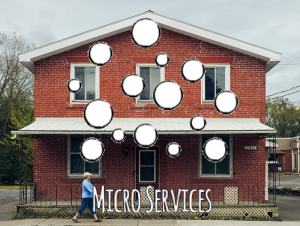I attended YOW! Sydney 2014 and thought some people might get something useful out of my notes. These aren’t my complete reinterpretations of every slide, but just things I jotted down that I thought were interesting enough to remember or look into further.
 Beth Skurrie (@bethesque) from DiUS, Evan Bottcher (@evanbottcher) from Thoughtworks and Jon Eaves (@joneaves) from REA group spoke about migrating realestate.com.au to a microservices architecture. (Slides, Video)
Beth Skurrie (@bethesque) from DiUS, Evan Bottcher (@evanbottcher) from Thoughtworks and Jon Eaves (@joneaves) from REA group spoke about migrating realestate.com.au to a microservices architecture. (Slides, Video)
Why REA migrated to microservices
They started by talking about why they started doing microservices:
- They had a long release cycle,
- they were doing coupled releases,
- with coupled rollbacks,
- and they had a long defect fix time.
How do you get self-empowered teams to change the whole architecture?
However, there was a realisation that changing things at REA is a bit hard, partly because the teams are very self-empowered, they’re trusted, and they value their independence.
In order to convince teams that trying a new architecture was a good idea, they came up with a vision of where they wanted to go, which included: Continue reading

 The benefits of going functional are to get to code that is: Modular, Abstract, Composable.
The benefits of going functional are to get to code that is: Modular, Abstract, Composable.